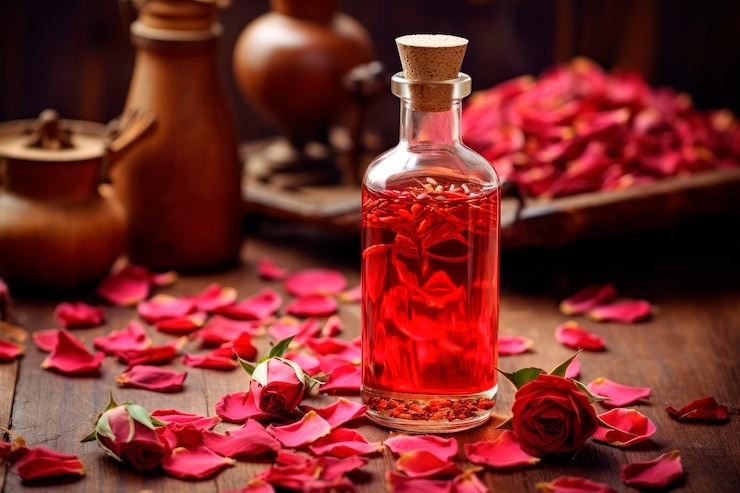Rose water, also known as Gulab Jal in Hindi, is a fragrant liquid derived from rose petals through a distillation process. This natural elixir has been cherished for centuries due to its enchanting fragrance and versatile applications in skincare, culinary delights, and medicinal practices. While many people are familiar with some common uses of rose water, such as a toner or a flavouring agent, there are several lesser-known benefits that make it a true gift of nature.
In addition to its delicate scent, rose water is celebrated for its potential to promote emotional well-being. The gentle aroma of rose water is believed to have a calming effect on the mind and spirit, offering a sense of tranquility and comfort. When added to bath water, the soothing properties of rose water can contribute to a relaxing and rejuvenating bathing experience, helping to alleviate stress and promote emotional healing.
Furthermore, rose water is renowned for its skin-nourishing properties. It can be used as a natural toner to restore the skin’s pH balance, minimise pores, and gently hydrate the skin. The anti-inflammatory and antioxidant properties of rose water may also help soothe irritation, reduce redness, and protect the skin from environmental stressors. Additionally, its natural astringent properties can assist in cleansing and refreshing the skin, making it a versatile addition to any skincare routine.
Beyond its benefits for emotional well-being and skincare, rose water holds a revered place in culinary traditions. From delicate pastries to refreshing beverages, rose water lends a subtle floral note and aromatic essence to a variety of dishes. Its infusion into sweet treats, beverages, and savoury dishes adds a delightful touch, elevating the overall sensory experience of these culinary creations.
Medicinally, rose water has been used in traditional practices for its potential to support digestive health, soothe sore throats, and alleviate mild skin irritations. Its gentle nature and captivating fragrance have made it a cherished ingredient in holistic approaches to well-being.
In essence, the multifaceted benefits of rose water extend far beyond its captivating fragrance, making it a cherished natural elixir with a rich history of diverse applications across cultures and traditions. Whether enjoyed in self-care rituals, culinary endeavours, or traditional remedies, the enchanting essence of rose water continues to inspire and rejuvenate, leaving a lasting impression as a truly versatile gift of nature.
Benefits for Emotional Well-being
Aromatherapy Properties
The aroma of rose water has a calming effect on the mind, making it a popular choice for aromatherapy. Inhaling its gentle scent can help alleviate stress and anxiety, promoting relaxation and emotional balance.
Stress Relief
The soothing properties of rose water are known to reduce tension and stress. Incorporating it into daily rituals like bath time or meditation can create a tranquil atmosphere conducive to relaxation and inner peace.
Mood Enhancement
The subtle scent of rose water has uplifting effects on mood, helping to elevate spirits and enhance overall well-being. Its sweet fragrance can evoke feelings of joy and contentment, making it a valuable ally in combating negative emotions.
Skincare Benefits
Natural Toner
Rose water acts as a gentle astringent, tightening pores and balancing the skin’s pH levels. It helps remove excess oil and impurities, leaving the skin refreshed and revitalized.
Hydration and Moisturization
Rich in antioxidants and vitamins, rose water nourishes the skin and helps maintain moisture levels. Regular use can prevent dryness and promote a healthy, radiant complexion.
Anti-inflammatory Properties
The anti-inflammatory properties of rose water make it effective in soothing irritation and redness. It can alleviate symptoms of conditions like acne, eczema, and rosacea, promoting clearer, calmer skin.
How to Use Rose Water
Rose water can be incorporated into your daily skincare routine in various ways:
Topical Application: Apply directly to the skin using a cotton pad or spray bottle.
Facial Toner: Use as a refreshing toner after cleansing to tighten pores and hydrate the skin.
Bath Additive: Add a few drops to your bathwater for a luxurious and aromatic experience.
Choosing the Right Rose Water
When selecting rose water, consider the following factors:
Quality Considerations: Look for pure, organic rose water without additives or synthetic fragrances.
Organic vs. Synthetic: Opt for organic rose water to ensure the highest quality and potency of active ingredients.
Rose Water in Traditional Medicine
Throughout history, rose water has held a prominent place in traditional medicine systems around the world. Its therapeutic properties were valued for treating various ailments, from digestive issues to skin conditions. Across different cultures, rose water was used in rituals and ceremonies to promote health and well-being.
Scientific Evidence and Studies
Recent scientific research has begun to validate the traditional uses of rose water. Studies have shown promising results regarding its efficacy in aromatherapy for stress reduction and its benefits for skin health. Clinical trials have demonstrated its effectiveness in improving hydration, reducing inflammation, and enhancing overall skin quality.
Side Effects and Precautions
While generally considered safe for most skin types, some individuals may experience allergic reactions to rose water. Before using it frequently, it’s suggested to conduct a patch test, particularly if you have sensitive skin or a history of allergies.
Rose Water in Modern Beauty Products
The popularity of rose water has surged in recent years, leading to its widespread incorporation into modern beauty products. From facial mists to serums and creams, skincare brands are harnessing the power of rose water to provide consumers with natural and effective solutions for their skincare needs.
Sustainability and Ethical Sourcing
As demand for rose water grows, it’s essential to consider the environmental and ethical implications of its production. Sustainable practices, such as organic farming and fair trade sourcing, ensure that the benefits of rose water are enjoyed responsibly without harming the environment or exploiting communities.
Combining Rose Water with Other Ingredients
Rose water can be combined with other natural ingredients to enhance its efficacy and tailor it to specific skincare concerns. From soothing chamomile to rejuvenating aloe vera, the possibilities are endless for creating custom skincare formulations that cater to individual needs.
Popular Myths and Misconceptions
Despite its long history of use, there are occasionally misconceptions and myths surrounding rose water. Dispelling misinformation and clarifying its true benefits is essential for ensuring that consumers can make informed decisions about incorporating rose water into their skincare routines.
User Testimonials and Reviews
Many individuals have shared their experiences with rose water, praising its effectiveness in improving skin texture, reducing acne, and promoting overall well-being. These firsthand accounts serve as testament to the enduring popularity and efficacy of this ancient remedy.




